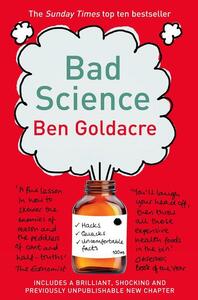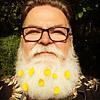Take a photo of a barcode or cover
3.5 stars
Ben Goldacre debunks a wide range of popular "science" - from those weird foot detox pads, to "Doctor" Gillian McKeith, homeopathy, placebos, "brain gym", fish oil and much more. He thinks that water, exercise and good food are important but can't fathom why that's not enough, why it has to be packaged up and sold to us.
This isn't the type of book I could sit down and read all in one go - as is shown by the fact that I started it over 2 months ago - but I did like Ben's writing style and parts of it were really interesting as well as being very funny.
Parts I liked in particular were his tales of creating the "world's first detoxing Barbie" by showing how the supposed toxins on the bottom of foot detox pads are nothing more than a chemical reaction between the water and contents of the pads (I always wondered how they worked).
Homeopathy sounds absolutely ridiculous when you get down to the bones of it - banging a flask of water 10 times on a leather & horsehair surface so the water can retain a memory of a molecule!
I liked the quote he used from Voltaire: "The art of medicine involves amusing the patient while nature cures the disease."
I skimmed through some of the chapters, but this quote from the one about Gillian McKeith and her claim that greens have more chlorophyll and oxygenate blood made me HOWL: "Is chlorophyll high in oxygen? No. It helps to make oxygen. In sunlight. And it's pretty dark in your bowels.....even if Dr. Gillian McKeith PhD stuck a searchlight right up your bum to prove her point, and your salad began photosynthezing...you still wouldn't absorb a significant amount of it through your bowel, because your bowel is adapted to absorb food, while your lungs are optimized to absorb oxygen. You do not have gills in your bowels."
A really interesting read, and it also made me want to find out more about Mr. Kellogg, who seems like quite a character.
Ben Goldacre debunks a wide range of popular "science" - from those weird foot detox pads, to "Doctor" Gillian McKeith, homeopathy, placebos, "brain gym", fish oil and much more. He thinks that water, exercise and good food are important but can't fathom why that's not enough, why it has to be packaged up and sold to us.
This isn't the type of book I could sit down and read all in one go - as is shown by the fact that I started it over 2 months ago - but I did like Ben's writing style and parts of it were really interesting as well as being very funny.
Parts I liked in particular were his tales of creating the "world's first detoxing Barbie" by showing how the supposed toxins on the bottom of foot detox pads are nothing more than a chemical reaction between the water and contents of the pads (I always wondered how they worked).
Homeopathy sounds absolutely ridiculous when you get down to the bones of it - banging a flask of water 10 times on a leather & horsehair surface so the water can retain a memory of a molecule!
I liked the quote he used from Voltaire: "The art of medicine involves amusing the patient while nature cures the disease."
I skimmed through some of the chapters, but this quote from the one about Gillian McKeith and her claim that greens have more chlorophyll and oxygenate blood made me HOWL: "Is chlorophyll high in oxygen? No. It helps to make oxygen. In sunlight. And it's pretty dark in your bowels.....even if Dr. Gillian McKeith PhD stuck a searchlight right up your bum to prove her point, and your salad began photosynthezing...you still wouldn't absorb a significant amount of it through your bowel, because your bowel is adapted to absorb food, while your lungs are optimized to absorb oxygen. You do not have gills in your bowels."
A really interesting read, and it also made me want to find out more about Mr. Kellogg, who seems like quite a character.
Ben Goldacre is a medical doctor, which is why the bad science in this book is all biological, mostly related to health - it's what he knows about. It's also mostly what we hear about, in terms of science, from mainstream media such as newspapers, magazines and television, as he observes, with evidence.
Goldacre starts with the simplest ideas of how to conduct medical trials, introducing concepts such as control groups, blinding, double blinding and randomisation whilst demolishing the claims of various quacks and charlatans. As the book goes along the ideas do get more sophisticated but are always clearly explained and never really demanding of the intellect - and the exposure of malicious malpractise, fraud, incompetence, bogus experts with made up or bought qualifications and ignorant or malicious scaremongering go on - and on - and on!
Goldacre writes with humour but also and more powerfully with anger - there is barely contained rage hiding on almost every page and as I read on it was hard not to feel that rage, too - and fear and horror. The chapter about how the South African AIDS treatment policy was subverted from the use of anti-retroviral drugs to the promotion of vitamin pills is sickening. He also continually flatters the reader by saying he is clever and then going on to say that the concepts he is explaining are not difficult - which seems a little contradictory to me; if the concepts aren't difficult one isn't smart because one understands them.
By the way, he does believe his entire readership is male - but does the evidence back that up? No! Tut, tut, Dr. Goldacre! This illustrates a point not made in the book, which is very relevent; we are bombarded with advertising and PR claims and even the most determinedly, habitually sceptical of us will sometimes fail to see the wood for the trees. We cannot check every single claim made to us - am I going to check all of Goldacre's references? No. But I should do - why should I believe him more than the next guy or gal? Because he has nothing to gain? Not so! He makes a living in part by writing, so he is under a temptation to try to increase his sales by the same sensationalising techniques he accuses other journalists of. In the end you have to trust some-one - there's no escaping it - and sometimes you might make a wrong judgement about whom.
This can be quite subtle - a number of times Goldacre mentions methods employed by pharmaceutical companies to disguise the fact that SSRI anti-depressants are not much more effective than placebos. I once heard a woman (name forgotten) on a Radio 4 discussion program pushing an agenda of essentially claiming that depression is best treated by non-pharmaceutical therapies and is not different from sadness anyway. Her contention was that "anti-depressants do not work much better than placebos." This is wrong! "But Goldacre says in his book that's true!" you (may) cry! No, he doesn't. He says that SSRI anti-depressants appear not to work much better than placebos when all the available evidence is taken into consideration. Anti-depressents are not all SSRIs - there are SNRIs and tricyclics to my certain knowledge and most likely a number of other types. This woman was using the exposure of bad science on the part of pharmaceutical companies as her method of attempting to perpetrate bad science (and consequent misery, harm and possible deaths) on the general public! Trials comparing an SNRI drug with a number of SSRI drugs showed that the SNRI is more effective than the SSRIs. Trials on SSRIs show that they have more effect on more severely depressed people - in other words people who are not merely sad and actually need therapeutic intervention. The story of SSRI efficacy research is not over - we have discovered that we haven't yet asked the right questions about them. (Just to be absolutely clear - I do not disagree with Goldacre's statements about SSRI efficacy - as far as they go. More work needs to be done to elucidate just how depressed a person needs to be for prescription of antidepressant drugs to be a worthwhile therapy. I doubt he'd disagree with my view, either.)
So I discovered what this woman's fallacious claim was, months afterwards and fortuitously, because I simply do not have time to investigate every claim I'm exposed to. I can tackle many by applying logic and arithmatic, in my head and fairly quickly but problems arise when the only way to check is to read the original research.
This is also where Goldacre struggles; he concedes that attempting to improve the standard of scientific journalism or entirely eliminating the negative effects of the profit motive from pharmaceutical research are not practical goals. So what are we meant to do? Goldacre has a few fairly small suggestions at a policy level that look as if they should make a notable difference but ultimately he says - read my book - then check claims yourself, 'cos you'll know how. Post your findings on the net. He also says it doesn't matter if he only reaches a small number of people.
He's saying some is better than none, I suppose - and that if we each did a bit the total would be large - but here's the rub - should I trust what's being said on the badscience website - or should I check it out for myself? Because that regular poster might have a hidden agenda and false qualifications and PR company backing and pharmaceutical company stock.
So who are you going to trust and how are you going to decide?
Well, if you trust me (and I'm not claiming you should) buy this book and read it. Soon.
Goldacre starts with the simplest ideas of how to conduct medical trials, introducing concepts such as control groups, blinding, double blinding and randomisation whilst demolishing the claims of various quacks and charlatans. As the book goes along the ideas do get more sophisticated but are always clearly explained and never really demanding of the intellect - and the exposure of malicious malpractise, fraud, incompetence, bogus experts with made up or bought qualifications and ignorant or malicious scaremongering go on - and on - and on!
Goldacre writes with humour but also and more powerfully with anger - there is barely contained rage hiding on almost every page and as I read on it was hard not to feel that rage, too - and fear and horror. The chapter about how the South African AIDS treatment policy was subverted from the use of anti-retroviral drugs to the promotion of vitamin pills is sickening. He also continually flatters the reader by saying he is clever and then going on to say that the concepts he is explaining are not difficult - which seems a little contradictory to me; if the concepts aren't difficult one isn't smart because one understands them.
By the way, he does believe his entire readership is male - but does the evidence back that up? No! Tut, tut, Dr. Goldacre! This illustrates a point not made in the book, which is very relevent; we are bombarded with advertising and PR claims and even the most determinedly, habitually sceptical of us will sometimes fail to see the wood for the trees. We cannot check every single claim made to us - am I going to check all of Goldacre's references? No. But I should do - why should I believe him more than the next guy or gal? Because he has nothing to gain? Not so! He makes a living in part by writing, so he is under a temptation to try to increase his sales by the same sensationalising techniques he accuses other journalists of. In the end you have to trust some-one - there's no escaping it - and sometimes you might make a wrong judgement about whom.
This can be quite subtle - a number of times Goldacre mentions methods employed by pharmaceutical companies to disguise the fact that SSRI anti-depressants are not much more effective than placebos. I once heard a woman (name forgotten) on a Radio 4 discussion program pushing an agenda of essentially claiming that depression is best treated by non-pharmaceutical therapies and is not different from sadness anyway. Her contention was that "anti-depressants do not work much better than placebos." This is wrong! "But Goldacre says in his book that's true!" you (may) cry! No, he doesn't. He says that SSRI anti-depressants appear not to work much better than placebos when all the available evidence is taken into consideration. Anti-depressents are not all SSRIs - there are SNRIs and tricyclics to my certain knowledge and most likely a number of other types. This woman was using the exposure of bad science on the part of pharmaceutical companies as her method of attempting to perpetrate bad science (and consequent misery, harm and possible deaths) on the general public! Trials comparing an SNRI drug with a number of SSRI drugs showed that the SNRI is more effective than the SSRIs. Trials on SSRIs show that they have more effect on more severely depressed people - in other words people who are not merely sad and actually need therapeutic intervention. The story of SSRI efficacy research is not over - we have discovered that we haven't yet asked the right questions about them. (Just to be absolutely clear - I do not disagree with Goldacre's statements about SSRI efficacy - as far as they go. More work needs to be done to elucidate just how depressed a person needs to be for prescription of antidepressant drugs to be a worthwhile therapy. I doubt he'd disagree with my view, either.)
So I discovered what this woman's fallacious claim was, months afterwards and fortuitously, because I simply do not have time to investigate every claim I'm exposed to. I can tackle many by applying logic and arithmatic, in my head and fairly quickly but problems arise when the only way to check is to read the original research.
This is also where Goldacre struggles; he concedes that attempting to improve the standard of scientific journalism or entirely eliminating the negative effects of the profit motive from pharmaceutical research are not practical goals. So what are we meant to do? Goldacre has a few fairly small suggestions at a policy level that look as if they should make a notable difference but ultimately he says - read my book - then check claims yourself, 'cos you'll know how. Post your findings on the net. He also says it doesn't matter if he only reaches a small number of people.
He's saying some is better than none, I suppose - and that if we each did a bit the total would be large - but here's the rub - should I trust what's being said on the badscience website - or should I check it out for myself? Because that regular poster might have a hidden agenda and false qualifications and PR company backing and pharmaceutical company stock.
So who are you going to trust and how are you going to decide?
Well, if you trust me (and I'm not claiming you should) buy this book and read it. Soon.
It took me a few chapters to get into this, but once I did, I was hooked. Gave me a lot to think about, particularly in evaluating information in textbooks and course materials I use.
An enjoyable rant, worth a quick flick through, but bare of depth and originality.
The books in his notes were way better reading and gave a clearer picture of the mountebanks that are working in the various industries that lie and manipulate to take your money from you.
Worth a quick read to push the reader in the right direction.
The books in his notes were way better reading and gave a clearer picture of the mountebanks that are working in the various industries that lie and manipulate to take your money from you.
Worth a quick read to push the reader in the right direction.
I have to say i'm not 100% sure i took everything in but i think enough soaked into my brain. As a medical librarian i already know the benefits of critically appraising everything you read, that only positive research gets published etc. But i like to think that i have had an effect on some of the people coming into my library who are working on topics that aren't super exciting or ground breaking, but they will change the way things are done. I did enjoy a lot of this book but felt that Ben does like to rant a little at times which could cause some people to shy away from this book. But i say you should give it a real go and i will be advertising it a lot more in my library so that more people can get the benefit.



